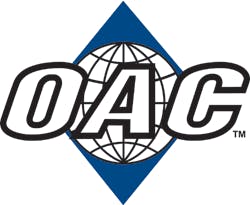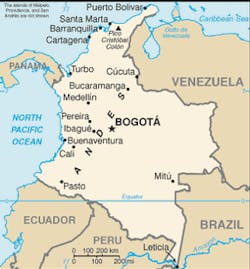Like this article? Sign up for our enews blasts here.
Back in June, North American aftermarket players trekked south to Bogota to commune with colleagues with the aim of doing trade. And how did that go?
“For me, one major revelation was the discovery that people in Columbia actually like Americans and American products,” recalls Caroline Perrotta, manager, sales and operations, automotive division, with Intraco Corporation (www.intracousa.com), an export management company with offices in Troy, Mich., in the business of transacting international sales on behalf of North American manufacturers. “There's the perception there that U.S.-made products are worth buying because they're high quality. I was also comfortable in Bogota. The culture is very similar to our own, and the people you do business with have money to pay for what they buy. Don't be fooled by the movies. You don't see men in uniform stomping up and down the streets with AK 47s strapped around their shoulders. Columbia is an open country with an entrepreneurial attitude. I feel safe there.”
Problems, protocols and promise
Pre-NAFTA, Columbia and most of the rest of Latin America was a vexing place to do business, mainly due to draconian rules of trade and steep tariffs. This is true no longer, says Troy Downey of Downey Automotive, a Birmingham, Ala.-based provider of overstocks to Mom and Pop auto parts suppliers that lack the purchasing power of chain operations. According to Downey, roughly 90 percent of the tariffs once inhibiting international trade in Columbia have disappeared, leveling the field for North American companies with a yearning to play.
Columbia is tailor-made for overstock suppliers like Downey, for whom late-model parts are stock-in-trade. “In Columbia you have a large older car population,” he explains. “Roads are terrible, and the middle class is relatively small, but growing. Only about 7 percent of the population use the Internet, but more younger people go online all the time, and this offers companies like mine the opportunity to make contact.”
Columbia has evolved into an opportunity for North American automotive aftermarket companies, but problems remain. Few of the older vehicles encountered on the road are U.S.-manufactured. This presents a hurdle to a U.S. parts provider with Colombian customers, but to an enterprising player, one not unassailable. Older Renaults haunt the Columbia highways in vast numbers, Downey says, and to tap this potential market, he has commissioned an engine parts manufacturer in Puerto Rico to channel him all the older Renault brand he has in stock.
Colombian auto parts suppliers also inventory by application rather than SKU, forcing the majority of suppliers in this country to modify the way in which they sell them stock. Shipping can be a problem too, a pricey one when doing business internationally, but one resolvable via alliance with another part supplier, or even entities outside the industry. Downey is currently in dialog with a coal company that ships to Columbia three times each day. Might it be mutually beneficial to arrange for the coal provider to piggyback Columbia-bound parts shipments? Necessity, mother of invention, is also the parent of profit.
“Columbia is open for business,” adds John Brunke, international sales director, Affinia Global Sales, a filter, chassis and brake parts manufacturer in Troy, Mich. “International business often means dealing with sales agents and middlemen in multiple countries. It can be a complicated, frustrating process. At the Bogota show there were independent reps on the floor facilitating one-on-one meetings between North American suppliers and potential customers. Everyone you needed to deal with was there under one roof. It was the best of all possible worlds.”
Culture and commerce
Columbia is a polite society. People speak softly, act formally and dress well. This contrasts sharply with the business protocols in effect in North America, especially the U.S. Americans are a brash breed and this element of our national character sometimes abrades the sensitivities of people in other parts of the world. Brashness is a cultural feature much in evidence in the Northeast, where residents speak their minds (usually in a hurry) and make a big point of presenting themselves as rugged individualists. This can be a culture shock for a newcomer to this land, who's native language offers two dozen ways to say “please.”
While cultural differences are rarely irreconcilable, they do factor in when doing international business. The good news is that culturally speaking, there is more in Columbia that U.S. folk will find familiar than not. Cultural differences remain nevertheless. Courtesy is currency, says Perotta. It also helps to speak Spanish, as a great many Colombians are monolingual (a trait they share with North Americans.) Even Spanish that is poorly enunciated and syntactically flawed is better than no Spanish at all. Colombians will hugely appreciate the effort, as it demonstrates respect for their culture and a willing to connect with them on their own ground.
“International business is all about mutual respect,” Perrotta says. “If you want to trade with someone overseas, you have to be willing to meet in person and commit to what may turn out to be a long-term developmental process. The process will not be the same from country to country, nor will it transpire at the same rate in Latin America as it might in Asia, Europe or Africa. Every situation is case by case, and more often than not, well worth the effort.”



